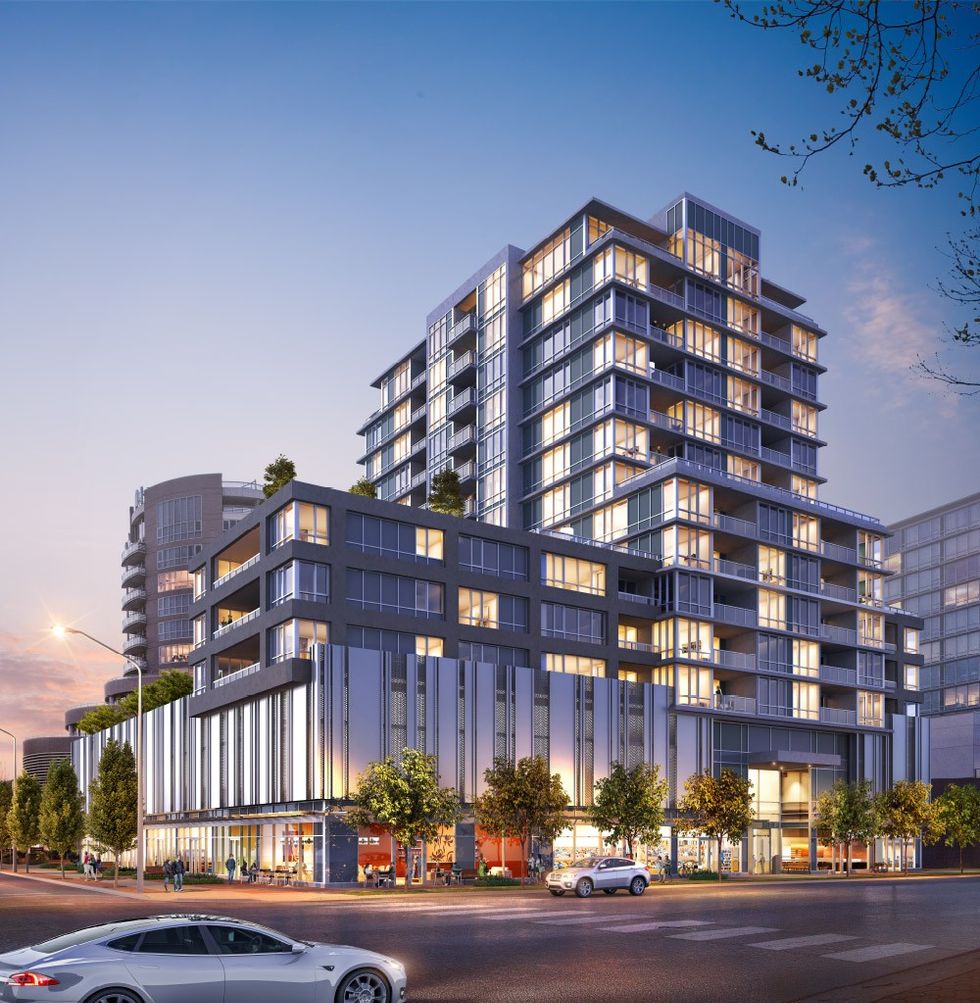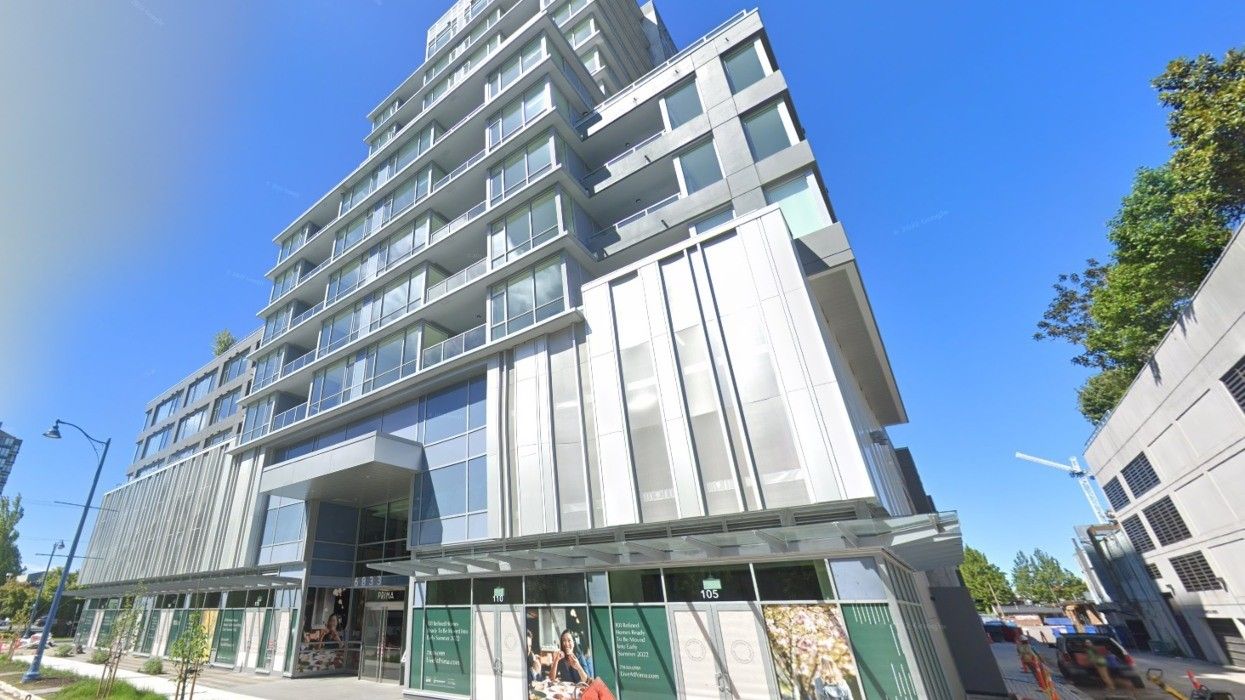After an extensive trial that saw hearings throughout November and December, the Supreme Court of British Columbia ruled in favour of the more than 30 presale purchasers who sued the developer of the condo building where they each bought a unit. Anderson Square Holdings must now pay the purchasers a total of $13,093,000.
The condo development at hand is the 15-storey Prima building that sits at 6833 Buswell Steet in Richmond, at the intersection with Anderson Road, just one block east from the CF Richmond Centre shopping centre. The developer of Prima is Anderson Square, which is helmed by Keung Sun (Sunny) Ho and Jia An (Jeremy) Liang, both of whom were listed as defendants.
The lawsuit was commenced by the presale purchasers in November 2019, a few months after Anderson Square Holdings sent letters informing them that their purchase agreements were being terminated because the developer would not be able to deliver the project by the listed outside completion date of September 30, 2019. The purchasers were also informed that they would receive a refund of their deposits, with interest.
The purchasers, however, did not accept the refunds and instead opted to commence the lawsuit.
The Trial
One critical aspect of the dispute was the interpretation of two clauses in the presale purchase agreement, which both involved the outside completion date, the circumstances under which it could be extended, and to what extent. In his discussion of the two clauses, Justice Kevin Loo found that they were worded in ways that could be interpreted to be in conflict with each other.
The central question arising from the issue was "whether Anderson Square was entitled to terminate the contracts under the last part of clause 21: that is, whether a 'Major Outside Event' had, in the determination of the [developer], rendered it impossible or not reasonably feasible or economical for the [developer] to perform its obligations under the contracts."
In the termination letters to the presale purchasers, Anderson Square said they were "facing serious and significant circumstances beyond our reasonable control."
The first example Anderson Square pointed to was a lawsuit filed against them by Scott Construction Group, who signed a contract in January 2017 for $37,871,400 to build the project. In Fall 2018, a dispute arose between the two parties over costs associated with delays, with Scott Construction seeking an additional $4,656,468 from Anderson Square, who had only paid about $16.7M throughout 2018 and 2019. Scott Construction eventually terminated their contract with Anderson Square in August 2019.
Justice Loo found this to be an unsatisfactory reason for the developer to invoke Clause 21.
"The 2018 Scott Claim was commenced more than six months prior to the Termination Notices being issued, and nothing had happened to move the claim forward since then," Justice Loo pointed out. "Mr. Ho testified that he believed that none of the amounts claimed by Scott Construction were owing, and, to the contrary, he believed that Scott Construction owed money to Anderson Square. Notably, the defendants could not explain how a $4M claim that was commenced in December 2018, which they believed was unmeritorious, made the project uneconomical in July 2019."
The second example Anderson Square pointed to as justification for the termination was that they were having trouble securing further construction financing, saying that the project "cannot cannot be granted a satisfactory commitment in this uncertain business environment."
Justice Loo again concluded that this was not a valid reason for the developer to terminate the purchase agreements.
"In my view, the financing representation was a half-truth, at best," said Loo. "It was true that Anderson Square had been unable to obtain a construction loan, as that term is generally used in Canada, from a local financial institution. However, the evidence shows that by early 2018, the defendants knew that Anderson Square would not be receiving financing from local institutions. The defendants could not explain why this suddenly became an issue in July 2019 which necessitated the termination of the contracts."

Additionally, Loo points out that the project was being financed by lenders in Hong Kong, with whom Jeremy Liang's father had business connections. Anderson Square reached four separate loan agreements (in May 2016, December 2019, December 2019, and March 2020) with those Hong Kong lenders, who advanced approximately $34M to Anderson Square by July 2019, and there was no evidence that the funding had ceased. Liang later testified that Anderson Square received another $11M between September 2019 and the end of 2020.
Loo also notes that after Scott Construction Group filed a second lawsuit against Anderson Square in April 2020, Anderson Square provided a response saying that "Anderson Square was at all times able to finance the completion of the Improvement," which Loo found to be a clear contradiction of the claims the developer made in the termination letters.
Furthermore, Justice Loo noted that "the best evidence that a lack of financing did not render performance impossible" is that five months after Anderson Square sent out the termination letters, it retained Valley West Construction Ltd. (now known as The Quorum Group) to complete the project, who did so in 2021 after receiving funding from both Hong Kong and local lenders. During that time, the project was also rebranded from its original name of "Alfa" to its current name.
Moreover, Justice Loo concluded that not only were the reasons the developer stated not valid, Sunny Ho and Jeremy Liang knew that the reasons were false or misleading "or that they were reckless as to whether this was so." Such cases of "dishonest performance" regarding contracts can sometimes lead to personal liability, but Justice Loo concluded that this was not one of those instances, "because no damages flow from that dishonest performance."
Elsewhere in his judgement, Justice Loo concluded that much of the testimony Sunny Ho provided was "not credible" and was "an attempt to rationalize false statements." Loo also concluded that Jeremy Liang "was very inexperienced in business and real estate matters," was a business student at UBC when he became a director of Anderson Square, and was given the opportunity by his father, a "successful and wealthy businessman in China."
The Money
If Anderson Square did not really have trouble securing financing, then why did the developers opt to terminate the contracts rather than just extend the outside completion date?
The answer, it appears, is the same thing that guides most business decisions: money.
During the trial, the presale purchasers relied on expert testimony give by Leah Zrnoh, a marketing specialist at Pilothouse Project Marketing. According to Zrnoh, the presale units purchased by the plaintiffs had increased in value, compared to the prices at the time the purchasers signed their contracts, by a collective $9.991M in July 2019 and by $13.094M in August 2021, which is to say that the developers would have made more money from terminating the contracts and reselling them.
Anderson Square questioned Zrnoh's qualifications, with their expert arguing that Zrnoh's reports did not meet the standards of the Appraisal Institute of Canada and that she did not outline her methodology. However, Justice Loo found that Zrnoh's detailed her methodology under cross-examination and that her reports "were not fatally flawed." Justice Loo also noted that Anderson Square and their expert, an appraiser named Andrew Love, did not provide any alternate market values to counter Zrnoh's findings.
Zrnoh's reports were ultimately admitted in their entirety and relied on by Justice Loo in awarding the $13,093,000 to the plaintiffs, which the Justice said were damages to the plaintiffs as of August 2021, when the presale purchasers ultimately accepted their deposit refunds. "The appropriate level of contractual damages for each plaintiff is the difference between the purchase price agreed to in that plaintiff’s individual contract [most of which were signed in 2015 and 2016] and the value of that plaintiff’s presale unit in August 2021," said Justice Loo.
All claims against Sunny Ho and Jeremy Liang personally were dismissed.
The Developer
The troubles for Anderson Square Holdings do not end with the $13M tab, however.
On November 27, 2023, Anderson Square Holdings filed a Notice of Intention to Make a Proposal (NOI) under the Bankruptcy and Insolvency Act, which allows companies to restructure their finances through a formal proposal to creditors. The tool is not dissimilar from companies filing for creditor protection under the Companies' Creditors Arrangement Act (CCAA), except the CCAA route is more suitable for companies with numerous subsidiaries.
Since filing its NOI in November, Anderson Square Holdings has been granted two extensions, with the most recent coming last week, extending the deadline the company has to submit its proposal until Tuesday, March 26.
In its latest report, dated February 6, the proposal trustee stated that of the 109 strata residential units and 10 strata retail units in Prima, 48 residential units and two commercial units remain unsold, which are currently listed for a collective value of $51.3M and $4.6M, respectively.
According to the proposal trustee, Anderson Square Holdings currently has $17.8M in cash on hand. The trustee says it has also begun discussions with commercial real estate brokerage Colliers to assess the estimated liquidation value and forced sale values.
Anderson Square Holdings' biggest outstanding debt, however, is the $64.1M it owes to its parent company, Anderson Plaza Holdings Inc. The trustee says that the debt stems from the construction financing that was advanced to Anderson Square Holdings and that mortgages have been registered against the unsold units in favour of Anderson Plaza Holdings, who is expected to file a proof of claim in the coming weeks.
It's unclear if Anderson Square Holdings will be able to submit a formal proposal. The deadline to file a proposal may not be extended beyond six months from the original NOI filing. If a company fails to file a proposal, it is then deemed to have made an assignment into bankruptcy.
- Inside The Mass Exodus At Coromandel Properties ›
- Planned 55-Storey Tower In Vancouver West End Placed Under Receivership ›
- Site Of Planned 28-Storey Tower In Vancouver West End To Be Sold ›
- Friends Sue Friends Over BC Development "Gone Terribly Wrong" ›
- Pace Developments' Barrie Project In Receivership Over $47M Debt ›
- Jingon To Redevelop Richmond Night Market Into 22-Acre Commercial District ›
- Thind Moving On From Minoru Square Project In Richmond ›





















